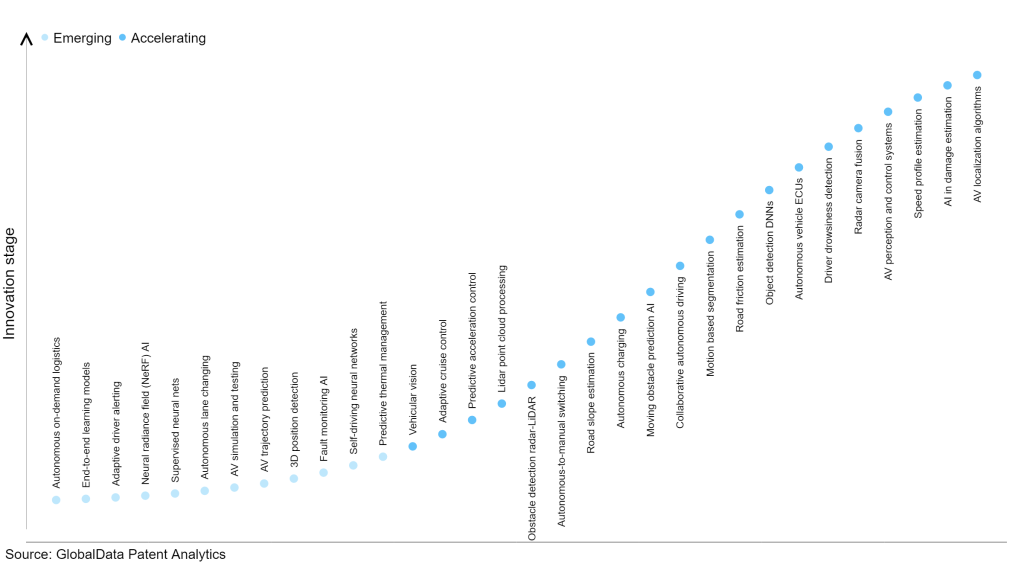The automotive industry continues to be a hotbed of patent innovation. Innovation in predictive thermal management (PTM) is driven by factors such as increasing complexity of electronic systems, growing demand for high-performance computing, improving energy efficiency, and the increasing demand for electric vehicles. PTM can help prevent performance degradation, reliability issues, and catastrophic failure. Digital twins, machine learning, and edge computing are key technologies in predictive thermal management. Digital twins simulate and predict system performance, enabling optimization of cooling systems and preventing thermal failures. Machine learning develops predictive thermal models, while artificial intelligence (AI) optimizes systems based on real-time data. Edge computing distributes computing resources to devices, reducing latency and improving performance. These technologies aim to make thermal management systems more efficient, reliable, and cost-effective. In the last three years alone, there have been over 1.7 million patents filed and granted in the automotive industry, according to GlobalData’s report on Artificial intelligence in automotive: predictive thermal management. Buy the report here.
However, not all innovations are equal and nor do they follow a constant upward trend. Instead, their evolution takes the form of an S-shaped curve that reflects their typical lifecycle from early emergence to accelerating adoption, before finally stabilizing and reaching maturity.
Identifying where a particular innovation is on this journey, especially those that are in the emerging and accelerating stages, is essential for understanding their current level of adoption and the likely future trajectory and impact they will have.
300+ innovations will shape the automotive industry
According to GlobalData’s Technology Foresights, which plots the S-curve for the automotive industry using innovation intensity models built on over one million patents, there are 300+ innovation areas that will shape the future of the industry.
Within the emerging innovation stage, autonomous on-demand logistics, end-to-end learning models, and adaptive driver alerting are disruptive technologies that are in the early stages of application and should be tracked closely. Vehicular vision, adaptive cruise control, and predictive acceleration control are some of the accelerating innovation areas, where adoption has been steadily increasing.
Innovation S-curve for artificial intelligence in the automotive industry

Predictive thermal management is a key innovation area in artificial intelligence
Predictive thermal management in electric vehicles refers to the use of advanced systems and technologies to regulate and manage the temperature of various components in an electric vehicle, particularly the battery pack, motor system, and power electronics. It involves the use of sensors, data analytics, and algorithms to predict temperature changes, optimize cooling and heating systems, and extend the range and overall performance of the electric vehicle.
GlobalData’s analysis also uncovers the companies at the forefront of each innovation area and assesses the potential reach and impact of their patenting activity across different applications and geographies. According to GlobalData, there are 30+ companies, spanning technology vendors, established automotive companies, and up-and-coming start-ups engaged in the development and application of predictive thermal management.
Key players in predictive thermal management – a disruptive innovation in the automotive industry
‘Application diversity’ measures the number of applications identified for each patent. It broadly splits companies into either ‘niche’ or ‘diversified’ innovators.
‘Geographic reach’ refers to the number of countries each patent is registered in. It reflects the breadth of geographic application intended, ranging from ‘global’ to ‘local’.
Patent volumes related to predictive thermal management
Source: GlobalData Patent Analytics
Hyundai Motor is one of the leading patent filers in predictive thermal management technology. One of the company’s latest patents focuses on an AI system that predicts vehicle thermal state, adjusting cooling systems to improve efficiency and reduce emissions. Hyundai's investment in predictive thermal management reflects its commitment to sustainable and efficient vehicles, particularly electric ones. Some other key patent filers in the space include Toyota Motor and Kia.
In terms of application diversity, Denso Corp leads the pack, while Siemens and Hitachi stood in the second and third positions, respectively. By means of geographic reach, Sumitomo Electric Industries held the top position followed by Hitachi and Tesla.
To further understand the key themes and technologies disrupting the automotive industry, access GlobalData’s latest thematic research report on Artificial Intelligence (AI) in Automotive.
Premium Insights
From
The gold standard of business intelligence.
Blending expert knowledge with cutting-edge technology, GlobalData’s unrivalled proprietary data will enable you to decode what’s happening in your market. You can make better informed decisions and gain a future-proof advantage over your competitors.



